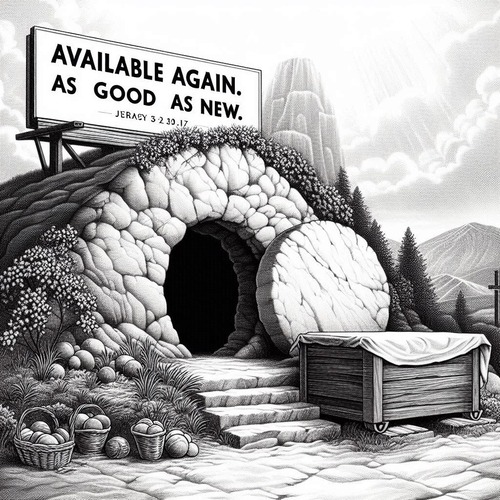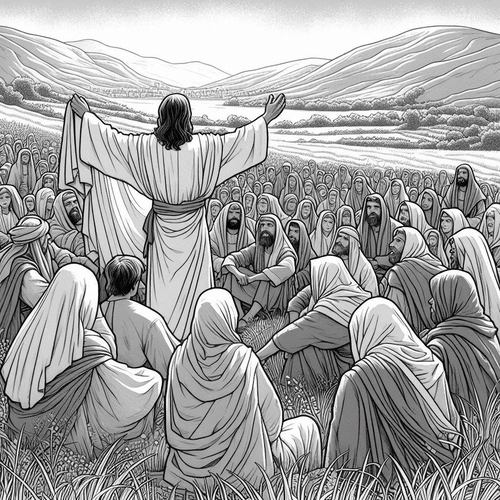Why Didn’t Jesus Come Before Noah’s Flood? God’s Perfect Timing…
Why Didn’t Jesus Come Before Noah’s Flood?
Salvation-wise, How Does It Matter? When considering the timing of Christ’s incarnation, we must first establish a crucial theological foundation: salvation has always been through faith alone, regardless of when someone lived in redemptive history. Whether before the flood, during the patriarchal period, or after Christ’s resurrection, the mechanism of salvation remains unchanged.
The Apostle Paul makes this clear: “Abraham believed God, and it was counted to him as righteousness” (Romans 4:3). This same principle applied to Noah, who “by faith… constructed an ark for the saving of his household” (Hebrews 11:7). The object of their faith—Christ—was future for them, yet their faith was no less effective for salvation than ours today.
With this vital truth established, we can explore the fascinating question of divine timing: Why didn’t Jesus come before the judgement in Noah’s time?
The Purpose of Noah’s Flood in God’s Covenant History
The flood wasn’t merely a reset button for humanity—it served multiple purposes in God’s redemptive plan. It demonstrated both God’s perfect justice toward sin and His merciful preservation of a remnant. Through the waters of judgement, God preserved the covenant line through Noah, establishing the Noahic covenant as a foundation for future redemptive history.
This universal covenant with Noah included promises that would create the necessary stability for God’s redemptive plan to unfold: “While the earth remains, seedtime and harvest, cold and heat, summer and winter, day and night, shall not cease” (Genesis 8:22). This predictability of natural order was essential for the coming stages of redemptive history.
God’s Progressive Revelation in Redemptive History
God’s reveals His redemptive plan like a master storyteller crafting a narrative. Each covenant built upon the previous one, developing humanity’s understanding of sin, judgement, and salvation. The flood established the severity of sin and the certainty of judgement. The Abrahamic covenant introduced the promise of blessing for all nations. The Mosaic covenant detailed the depth of our sin and our need for perfect righteousness.
This progressive revelation wasn’t arbitrary—it was necessary preparation. As Paul explains in Galatians 3:24, “The law was our guardian until Christ came.” Each stage of redemptive history served to prepare God’s people for the coming Messiah.
The Fullness of Time
Paul tells us Christ came “when the fullness of time had come” (Galatians 4:4). The first century AD represented a unique convergence of conditions that made it the perfect moment for Christ’s incarnation:
- The Pax Romana provided stability and communication networks across the known world
- Greek language and culture created a common framework for sharing ideas
- Jewish diaspora had spread knowledge of monotheism and messianic hope
- The Jewish sacrificial system had fully developed, providing the necessary theological background to understand Christ’s sacrifice
- Centuries of prophetic revelation had created precise expectations for the Messiah
These conditions didn’t exist during Noah’s time—they required centuries of historical development.
Theological Significance of the Order of Events
The flood serves as a powerful type of both judgment and salvation, which Peter explicitly connects to baptism (1 Peter 3:20-21). This typological relationship required the flood to precede Christ’s coming. Just as Noah’s family passed through the waters of judgment to emerge into a new world, believers pass through the waters of baptism to signify their union with Christ in His death and resurrection.
The period between Noah and Christ also established the depth of human depravity through repeated cycles of sin, judgment, and mercy. This historical demonstration was necessary to show why such an extreme remedy as the incarnation and crucifixion of God’s Son was required.
God’s Perfect Wisdom in His Timeline
Far from being an arbitrary choice, the timing of Christ’s incarnation reflects God’s perfect wisdom. The post-flood period wasn’t wasted time—it was necessary preparation. Through it, God demonstrated:
- The universality of sin across all cultures and times
- The inability of human government, law, or wisdom to solve our fundamental problem
- The need for a perfect sacrifice and mediator
- The fulfillment of specific prophecies that would identify the true Messiah
Each stage of history served to prepare the world for Christ, like a master composer building towards the perfect crescendo. The flood wasn’t the right time for Christ’s first coming—it was the right time for establishing truths that would make His coming understood and recognised when it occurred.
Conclusion
The timing of Christ’s incarnation reveals God’s wisdom in redemptive history. While salvation has always been by faith, the historical unfolding of God’s plan served to prepare humanity to understand and receive the Messiah. Noah’s flood played a crucial role in this preparation, demonstrating both the severity of sin and God’s commitment to both justice and mercy. The “fullness of time” required this foundation, along with centuries of progressive revelation, to create the perfect context for Christ’s coming.
Remember: in questioning God’s timing, we must trust that He who orchestrated all of history knows better than we do when each event should occur. As Isaiah reminds us, “For my thoughts are not your thoughts, neither are your ways my ways, declares the LORD” (Isaiah 55:8).
Why Didn’t Jesus Come Before Noah’s Flood?—Related FAQs
- What lessons may we apply from this study in appreciating God’s timing in our own lives? God’s perfect timing in redemptive history teaches us patience in our personal circumstances. Just as the world wasn’t ready for Christ during Noah’s time, what appears to be a delay in our lives may be God’s careful preparation for something greater. We can trust that God is working through every season of waiting, just as He worked through every period of redemptive history with purpose.
- What do we learn from God’s pattern of redemptive history? God’s redemptive pattern shows us He often works through progressive stages rather than immediate solutions. Each stage of history built upon previous revelations, teaching us God’s work in our lives often follows a similar pattern of gradual development and understanding. This should encourage us to value each stage in our spiritual growth, recognising even difficult periods serve as preparation for future grace.
- What comfort may we draw from God’s sovereign plan? The careful orchestration of redemptive history assures us God is equally sovereign over our personal histories. Just as He prepared the world through centuries for Christ’s coming, He prepares circumstances in our lives with similar care and purpose. Nothing in our lives is wasted or random; even what appears as delay or detour serves His perfect plan.
How are we to live in light of both Noah’s flood and Christ’s work? These two great events teach us to live with both sobriety about God’s judgement and joy in His salvation. The flood reminds us of God’s holiness and hatred of sin, while Christ’s work assures us of His overwhelming grace. This combination should produce in us a reverent life that neither presumes upon God’s grace nor lives in paralysing fear of His judgement.
- Does God’s timing in redemptive history suggest He might be slow in answering our prayers? God’s timing isn’t slowness but perfect wisdom in action, as Peter reminds us in 2 Peter 3:9. What appears as delay to us may be God orchestrating circumstances for our greater good, just as He did throughout redemptive history. His timing in answering our prayers is always perfect, though it may not align with our preferred schedule.
- Why didn’t God save more people in Noah’s time by sending Christ then? The issue wasn’t God’s timing but human hearts—people in Noah’s day rejected God’s warning through Noah’s preaching for 120 years. The timing of Christ’s coming doesn’t affect salvation, as people in every age are saved by faith. God’s choice of timing served His larger purpose of displaying both His justice and mercy throughout history.
- How does understanding God’s timing help us anticipate Christ’s second coming? Understanding God’s perfect timing in the first advent helps us trust His timing for the second advent. Just as the first coming required precise preparation and timing, we can trust the second coming will occur at exactly the right moment in history. This understanding should produce in us patient endurance and active watchfulness rather than anxiety or date-setting.
Why Didn’t Jesus Come Before Noah’s Flood?—Our Related Posts
Editor's Pick

Why Do People Hate the Doctrine of Election?
…WHEN THEY REALLY SHOULDN’T Few Bible doctrines provoke stronger reactions than election. The idea that God chose some for salvation [...]

The Doctrine of Providence: Does God Really Govern All Things?
You’re sitting in the doctor’s office when the diagnosis lands like a thunderclap. Your mind races: Why this? Why now? [...]

No Decay, No Defeat: What It Means That Christ’s Body Saw No Corruption
On the Day of Pentecost, Peter stood before thousands and made a startling claim: David's body decayed in the tomb, [...]
SUPPORT US:
Feel the Holy Spirit's gentle nudge to partner with us?
Donate Online:
Account Name: TRUTHS TO DIE FOR FOUNDATION
Account Number: 10243565459
Bank IFSC: IDFB0043391
Bank Name: IDFC FIRST BANK






